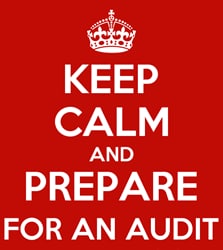Keep calm and prepare for a tax audit
A brown envelope from HMRC is never something you want to see in your in-tray. And if you open the envelope to read the dreaded news that your company is going to be the subject of a tax audit, you will be far from the first person to feel fear and foreboding, even if you have nothing to hide.

But instead of holding your head in your hands, take a deep breath and start to take control of the situation.
First things first. What will HMRC want to check?
In short, HMRC will want to check everything. One area that HMRC definitely will focus on – and many people worry about – is the expenses process. This is hardly surprising since travel and expenses are the biggest operating cost after salaries and are ripe for distortion whether fraudulently or not.
They’ll want to assess your entire expenses process from top to bottom, but they will check in particular that you:
- Have a clear and enforced policy
- Have set up the appropriate approval processes
- Regularly collect all the right documentation
- Have the appropriate checks and controls built into your process
- Are consistently compliant with tax and VAT legislation
- Have a robust and secure payment process in place
For more information on what HMRC is looking for and why when they examine your travel and expenses, you might like to read our whitepaper, Cracking the Code on Expense Compliance.
How can you turn fear into focus?
The best way to ensure you can approach an upcoming audit with equanimity is to ensure your company will pass because of not in spite of its processes.
When it comes to travel and expenses, the first step is to ensure you have a strong policy in place. You should include:
- Details of what is and what is not reimbursable
- Business travel guidelines
- Mileage and fuel rates for reimbursement
- Personal expenditure rules that cover circumstances and amounts as well as what is specifically excluded
It is also vital that everyone in your team from top to bottom understands and respects your policy (our Cracking the Code on Expense Compliance white paper has more on how to achieve this).
Look at your expenses process from end-to-end
The next step is to look at your travel and expenses process from end-to-end and see where it’s letting you down. One of the best ways to take control of the process is to banish spreadsheets and paper receipts and embrace expense management solutions, cloud-based technologies and mobile apps. Such solutions make it easy for employees to submit claims, managers to approve them and finance teams to audit them.
Systems like this enable you to build your expenses policy into them so that every claim can be automatically checked by the system. They reduce manual data entry by automatically extracting data from receipts and credit card feeds. They give you transparency and granularity at the click of a mouse, giving you the information you need in seconds not hours.
And of course, automation can have a dramatic effect on your costs – research suggests that companies with an automated expense solution in place have a 50-60% reduction in processing costs, which has to be good for business.
Good processes aren’t only important for HMRC
The important thing to remember about streamlining and automating expense processes is that they aren’t just good for satisfying HMRC, they’re also good for your business. With the right systems in place you can reduce administration time, increase productivity and improve morale. It begs the question: why wouldn’t you implement them?